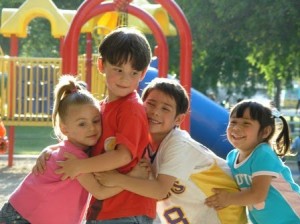 Today I want to share something I learned from NLP (otherwise known as neuro-linguistic programming) called a “state change”. We’re always in some sort of emotional state, whether happy, sad, excited, or frustrated. And often it feels like we’re at the whim of our emotions. When I’m frustrated it seems like there is no way to transform the frustration into something else. But there is! We can consciously create a “state change” in ourselves and often in others, pretty much any time we want!
Today I want to share something I learned from NLP (otherwise known as neuro-linguistic programming) called a “state change”. We’re always in some sort of emotional state, whether happy, sad, excited, or frustrated. And often it feels like we’re at the whim of our emotions. When I’m frustrated it seems like there is no way to transform the frustration into something else. But there is! We can consciously create a “state change” in ourselves and often in others, pretty much any time we want!
Creating the culture of your home
 It seems like just about the time we feel we’ve given all we can and we need some “me time” kids suddenly need even more from us. We can become frustrated and resentful and begin to give out of obligation or guilt, rather than giving from true generosity. If that’s what’s happening for you, my invitation for this week is to take a break, stop giving for a moment, and reset.
It seems like just about the time we feel we’ve given all we can and we need some “me time” kids suddenly need even more from us. We can become frustrated and resentful and begin to give out of obligation or guilt, rather than giving from true generosity. If that’s what’s happening for you, my invitation for this week is to take a break, stop giving for a moment, and reset.
See, the adults in the household are the ones who create the culture of the home, and if you’re spewing out frustration, resentment, and irritation, then pretty soon, you’ll start to see those same sentiments emanating from your kids.
Laughter, the perfect antidote for a power struggle.
 We’ve all been there, it’s time to leave, your child wants to stay and continue to play, you’re tired and ready to go, a conflict is brewing. How we handle these difficult moments can be the difference between a fantastic day and a really rough one. And really, either one is available to us in a given moment, we just have to be able to access enough creativity to create the fun, laughter filled connection we’re wanting, rather than falling into a negativity trap.
We’ve all been there, it’s time to leave, your child wants to stay and continue to play, you’re tired and ready to go, a conflict is brewing. How we handle these difficult moments can be the difference between a fantastic day and a really rough one. And really, either one is available to us in a given moment, we just have to be able to access enough creativity to create the fun, laughter filled connection we’re wanting, rather than falling into a negativity trap.
I know, you’re thinking, but wait, when I’m tired and grumpy, the LAST thing I am is creative. Well, that’s where I come in. I can offer you some fun strategies to create more laughter and connection and all you have to do is remember to use them when the time comes. Sound good?
Giving kids power helps them cooperate
 If you’re noticing that your kids are having a difficult time cooperating or listening or generally following your lead, first let me remind you, you’re not alone. Lots of parents go through this difficulty every day. I know it can be super frustrating when you’re just trying to get things done, or get to the store, or follow the rules, and your child is fighting you every step of the way.
If you’re noticing that your kids are having a difficult time cooperating or listening or generally following your lead, first let me remind you, you’re not alone. Lots of parents go through this difficulty every day. I know it can be super frustrating when you’re just trying to get things done, or get to the store, or follow the rules, and your child is fighting you every step of the way.
One way to encourage cooperation from kids is to designate some time each week (or day) where they get to be in charge. Somehow by allowing kids to take the lead for even 10 minutes a day, you’ll find that they’re much more willing to allow you to take the lead for the rest of the time. There are several ways you can do this.
The beautiful urge to bite and what to do about it
Young people are discovering their world and constantly coming up with strategies to meet their needs. Sometimes these strategies cause pain and upset in others and are experienced as destructive.
The most common examples of destructive behaviors in 1-5 year olds are hitting and biting. Older kids often use their words to destructive means. And teenagers do all sorts of behaviors that we adults see as destructive and dangerous. But what if we were able to see the beautiful needs behind these behaviors and redirect kids in a way that helps everyone experience more peace and joy?

